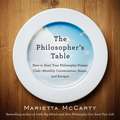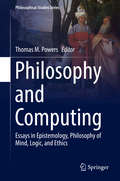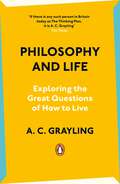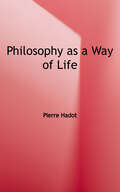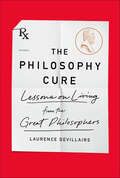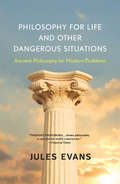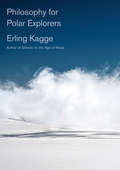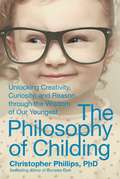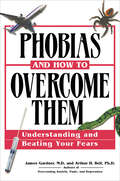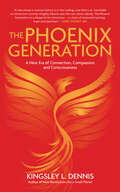- Table View
- List View
Philosophers Notes on: The Six Pillars of Self-Esteem by Nathaniel Branden
by Brian JohnsonPhilosophers Notes on: The Six Pillars of Self-Esteem by Nathaniel Branden. The essential points are condensed for more wisdom in less time.
Philosophers Notes on: The Spontaneous Fulfillment of Desire by Deepak Chopra
by Brian JohnsonPhilosophers Notes on: The Spontaneous Fulfillment of Desire by Deepak Chopra. The essential points are condensed for more wisdom in less time.
Philosophers Notes on: The Success Principles by Jack Canfield
by Brian JohnsonPhilosophers Notes on: The Success Principles by Jack Canfield. The essential points are condensed for more wisdom in less time.
Philosophers Notes on: The Thrive Diet by Brendan Brazier
by Brian JohnsonPhilosophers Notes on: The Thrive Diet by Brendan Brazier. The essential points are condensed for more wisdom in less time.
Philosophers Notes on: The Way of the Superior Man by David Deida
by Brian JohnsonPhilosophers Notes on: The Way of the Superior Man by David Deida. The essential points are condensed for more wisdom in less time.
Philosophers Notes on: The Wheel of Time by Carlos Castaneda
by Brian JohnsonPhilosophers Notes on: The Wheel of Time by Carlos Castaneda. The essential points are condensed for more wisdom in less time.
Philosophers Notes on: Think and Grow Rich by Napoleon Hill
by Brian JohnsonPhilosophers Notes on: Think and Grow Rich by Napoleon Hill. The essential points are condensed for more wisdom in less time.
Philosophers Notes on: Think on These Things by Jiddu Krishnamurti
by Brian JohnsonPhilosophers Notes on: Think on These Things by Jiddu Krishnamurti. The essential points are condensed for more wisdom in less time.
Philosophers Notes on: Thresholds of the Mind by Bill Harris
by Brian JohnsonPhilosophers Notes on: Thresholds of the Mind by Bill Harris. The essential points are condensed for more wisdom in less time.
Philosophers Notes on: Thus Spoke Zarathustra by Friedrich Nietzsche
by Brian JohnsonPhilosophers Notes on: Thus Spoke Zarathustra by Friedrich Nietzsche. The essential points are condensed for more wisdom in less time.
Philosophers Notes on: You Can Heal Your Life by Louise L. Hay
by Brian JohnsonPhilosophers Notes on: You Can Heal Your Life by Louise L. Hay. The essential points are condensed for more wisdom in less time.
Philosophers Notes on: Your Erroneous Zones by Dr. Wayne W. Dyer
by Brian JohnsonPhilosophers Notes on: Your Erroneous Zones by Dr. Wayne W. Dyer. The essential points are condensed for more wisdom in less time.
Philosopher's Notes on: The Bhagavad Gita
by Brian Johnson Eknath EaswaranPhilosophers Notes on: The Bhagavad Gita Translated and Edited by Eknath Easwaran. The essential points are condensed for more wisdom in less time.
The Philosopher's Table: How to Start Your Philosophy Dinner Club--Monthly Conversation, Music, and Recipes
by Marietta Mccarty"Talk doesn't cook rice. " -Chinese Proverb According to Socrates, knowledge is "food for the soul. " That's all well and good for the Socratic but, according to Maslow, food for the stomach is a far more pressing matter. But why can't you have your talk, and cook rice too? With The Philosopher's Table, Marietta McCarty shows you that you can. In this book, you will find all of the necessary ingredients to start a Philosophy Dinner Club, taking a monthly tour around the world with friends to sample hors d'oeuvres of succulent wisdom and fill your plate with food from each philosophers' home country. With recipes, theories, and insights both old and new-all peppered with McCarty's charming and informative prose-you and your friends will: -Enjoy fresh homemade lamb meatballs and tzatziki, and the simple pleasures of life in Epicurus's ancient Greek garden. -Practice nonviolence (in life and at the dinner table) while sharing tofu curry with Burma's Aung San Suu Kyi. -Learn the fundamentals of rational decision-making with a mouthful of bratwurst from Germany's Immanuel Kant -In the spirit of accepting change, ditch the familiar take-out containers and dine on homemade shrimp dumplings with China's Lao Tzu. -And so much more! Complete with McCarty's recommendations for ethnic music from each region to enjoy during your gatherings and discussion questions to prompt debate, The Philosopher's Table contains everything you need to leave your host's home brimming with both nutritional and mental satisfaction. .
Philosophy and Computing
by Thomas M. PowersThis book features papers from CEPE-IACAP 2015, a joint international conference focused on the philosophy of computing. Inside, readers will discover essays that explore current issues in epistemology, philosophy of mind, logic, and philosophy of science from the lens of computation. Coverage also examines applied issues related to ethical, social, and political interest. The contributors first explore how computation has changed philosophical inquiry. Computers are now capable of joining humans in exploring foundational issues. Thus, we can ponder machine-generated explanation, thought, agency, and other quite fascinating concepts. The papers are also concerned with normative aspects of the computer and information technology revolution. They examine technology-specific analyses of key challenges, from Big Data to autonomous robots to expert systems for infrastructure control and financial services. The virtue of a collection that ranges over philosophical questions, such as this one does, lies in the prospects for a more integrated understanding of issues. These are early days in the partnership between philosophy and information technology. Philosophers and researchers are still sorting out many foundational issues. They will need to deploy all of the tools of philosophy to establish this foundation. This volume admirably showcases those tools in the hands of some excellent scholars.
Philosophy and Life: Exploring the Great Questions of How to Live
by A. C. Grayling'Grayling brings satisfying order to daunting subjects' Steven Pinker'An enthusiastic thinker who embraces humour, common sense and lucidity' Independent_______________From the eminent philosopher, an authoritative exploration of the great questions of how to live'There is a question everyone has to ask and answer - in fact, has to keep on asking and keep on answering. It is, 'How should I live my life?' meaning, 'What values shall I live by? 'What sort of person should I be? What shall I aim for?' The great majority of people do not ask this question, they merely answer it unthinkingly, by adopting conventional views of life and what matters in it...'From Stoics to existentialists, in philosophy and literature, discussion of the philosophy of life -- of love and death, of courage, fortitude and wisdom -- challenges us all to think about what kinds of life are truly worth living. In this summation of a lifetime thinking and writing about this great question, A. C. Grayling explores with clarity and depth the ideas that each of us must use in answering it for ourselves.Drawing on the lives, experiences and works of a fantastically eclectic range of thinkers -- taking in not only philosophers such as Confucius, Seneca and Nietzsche, but also authors from Shakespeare to Ursula LeGuin, and modern thinkers such as Martha Nussbaum and Bernard Williams - Philosophy and Life brings together wisdom from across eras and continents in a tour de force on the philosophy of being human in a complicated world.
Philosophy As a Way of Life: Spiritual Exercises from Socrates to Foucault
by Pierre HadotThis book presents a history of spiritual exercises from Socrates to early Christianity, an account of their decline in modern philosophy, and a discussion of the different conceptions of philosophy that have accompanied the trajectory and fate of the theory and practice of spiritual exercises. Hadot's book demonstrates the extent to which philosophy has been, and still is, above all else a way of seeing and of being in the world.
The Philosophy Cure: Lessons on Living from the Great Philosophers
by Laurence DevillairsThe wisdom of famous philosophers distilled into practical takeaways for modern readersFor centuries, philosophers have considered the “big questions” of human life, mulling over everything from ethics to the definition of reality. Their ideas and insights are powerful and innovative, but often inaccessible and far too academic for most readers. In The Philosophy Cure: Lessons on Living from the Great Philosophers, scholar and expert on Cartesian philosophy, Laurence Devillairs has stripped away the convoluted language, translating the core ideas and wisdom of some of the most prominent philosophers into simple concepts for modern readers. She skillfully reveals that far from being impractical or distantly academic, philosophy is, at its heart, a deeply useful discipline ultimately concerned with what it means to live a good and fulfilling life. Perfect for readers who are intrigued with philosophy, but who are uninterested in reading dense academic texts, The Philosophy Cure reveals the true wisdom of the best-known philosophers—from Socrates to Kant and Descartes.
Philosophy for Life and Other Dangerous Situations
by Jules EvansWhen philosophy rescued him from an emotional crisis, Jules Evans became fascinated by how ideas invented over two thousand years ago can help us today. He interviewed soldiers, psychologists, gangsters, astronauts, and anarchists and discovered the ways that people are using philosophy now to build better lives. Ancient philosophy has inspired modern communities -- Socratic cafés, Stoic armies, Epicurean communes -- and even whole nations in the quest for the good life. This book is an invitation to a dream school with a rowdy faculty that includes twelve of the greatest philosophers from the ancient world, sharing their lessons on happiness, resilience, and much more. Lively and inspiring, this is philosophy for the street, for the workplace, for the battlefield, for love, for life.
Philosophy for Polar Explorers: What They Don't Teach You In School
by Erling KaggeA thoughtful, eloquent meditation on bringing adventure and exploration into your daily life, from the author of Silence and WalkingErling Kagge is an explorer par excellence. He has accomplished things that most of us can't even imagine--for example: he's climbed Mount Everest and reached both the North and South Poles on foot. Yet in this slim, inspiring, lyrical book, he teaches us how to apply an explorer's mentality to our own daily lives. Simple things like getting up early and accepting failure can make a difference whether we are battling an arctic storm en route to the South Pole or stuck in traffic on our way to work. And larger lessons, like learning not to chase happiness and being receptive to goals, can benefit our lives enormously.Punctuating these lessons with stories from his own life and travels, Kagge invites readers to treat life like an exploration and illuminates the possibilities that await us when we do.
The Philosophy of Childing: Unlocking Creativity, Curiosity, and Reason through the Wisdom of Our Youngest
by Christopher PhillipsWeaving together philosophy, social science and neuroscience research, personal anecdotes and dialogues, The Philosophy of Childing takes a radically different approach to the traditional boundaries between childhood and adulthood to reveal how rather than lapse into adulthood, we can achieve what the Greeks arete-all-around excellence-when we look to children and youth as a lodestar for our development.Childhood is our primary launching pad, a time of life when learning is more intense than at any other, when we gain the critical knowledge and skills that can help ensure that we remain adaptable. This book weaves together the thinking of philosophers from across the ages who make the unsettling assertion that with the passage of time we are apt to shrink mentally, emotionally, and cognitively. If we follow what has become an all-too-common course, we denature our original nature-which brims with curiosity, empathy, reason, wonder, and a will to experiment and understand-and we regress, our sense of who we are will become fuzzier and everyone in our orbit will pay a price.Mounting evidence shows that we begin our lives with a moral, intellectual, and creative bang, and in this groundbreaking, heavily researched and highly engaging volume, Christopher Phillips makes the provocative case that childhood isn’t merely a state of becoming, while adulthood is one of being, as if we’ve "arrived” and reached the summit. His life-changing proposition is that if we embrace the defining qualities of youth, we’re not destined to become frail, dispirited, or unhinged, we’ll grow in a way defined by wonder, curiosity, imaginativeness, playfulness, and compassion-in essence, unlimited potential.
Phobia Free: How to Fight Your Fears
by E. Ann Sutherland Zalman Amit Andrew WeinerHow a phobic sufferer can make himself completely phobia-free, without a therapist and with only the support of a friend, and stay that way for good.
Phobias and How to Overcome Them: Understanding and Beating Your Fears
by James Gardner Arthur H. BellFear of flying, fear of spiders, fear of crowds, fear of needles. There seems an endless list of phobias that between them afflict up to half the population. This book describes the most common hang-ups and how to come to terms with them.
The Phoenix Generation
by Kingsley L. DennisAccording to futurist and sociologist, Kingsley L. Dennis, humanity is entering a momentous phase in its history. Being born today is a generation of children that will radically reinvent human society, moving our culture from competition, control, and censorship toward connection, communication, and compassion. The Phoenix Generation's impact will begin to be felt in 2030, but there much to do to prepare for their arrival.The book is divided into three parts. Part one briefly describes the thorny issues (e.g. global warming, nationalism, and food and water shortages) that the solution-oriented ways of the Phoenix will resolve. Dennis posits that the generations of adults living today are the bridge to the Phoenix and he shows how such developments as the worldwide web and the explosion of mobile technologies are paving the way for them. Part two describes the changes in our own consciousness being brought about by technology and what we need to do to speed their arrival. Part three gives details how the Phoenix generation will be different from us. The Phoenix Generation will work toward forming a planetary society a transition more radical than the shift from agrarian to urban life during the Industrial Revolution. These children are being born with increased instinctive intelligence and with a greater degree of inherited wisdom. With them, the quantum revolution begun 100 years ago will become mainstream. This will bring about a shift away from external dependencies (e.g. our dependency on higher education for career advancement). This normalizing of new perspectives, cosmic awareness, and of multi-dimensional realities will usher in a great wave of change. The Phoenix Generation is a deeply positive examination of our collective future.
The Phoenix Generation
by Kingsley L. DennisAccording to futurist and sociologist, Kingsley L. Dennis, humanity is entering a momentous phase in its history. Being born today is a generation of children that will radically reinvent human society, moving our culture from competition, control, and censorship toward connection, communication, and compassion. The Phoenix Generation's impact will begin to be felt in 2030, but there much to do to prepare for their arrival.The book is divided into three parts. Part one briefly describes the thorny issues (e.g. global warming, nationalism, and food and water shortages) that the solution-oriented ways of the Phoenix will resolve. Dennis posits that the generations of adults living today are the bridge to the Phoenix and he shows how such developments as the worldwide web and the explosion of mobile technologies are paving the way for them. Part two describes the changes in our own consciousness being brought about by technology and what we need to do to speed their arrival. Part three gives details how the Phoenix generation will be different from us. The Phoenix Generation will work toward forming a planetary society a transition more radical than the shift from agrarian to urban life during the Industrial Revolution. These children are being born with increased instinctive intelligence and with a greater degree of inherited wisdom. With them, the quantum revolution begun 100 years ago will become mainstream. This will bring about a shift away from external dependencies (e.g. our dependency on higher education for career advancement). This normalizing of new perspectives, cosmic awareness, and of multi-dimensional realities will usher in a great wave of change. The Phoenix Generation is a deeply positive examination of our collective future.

